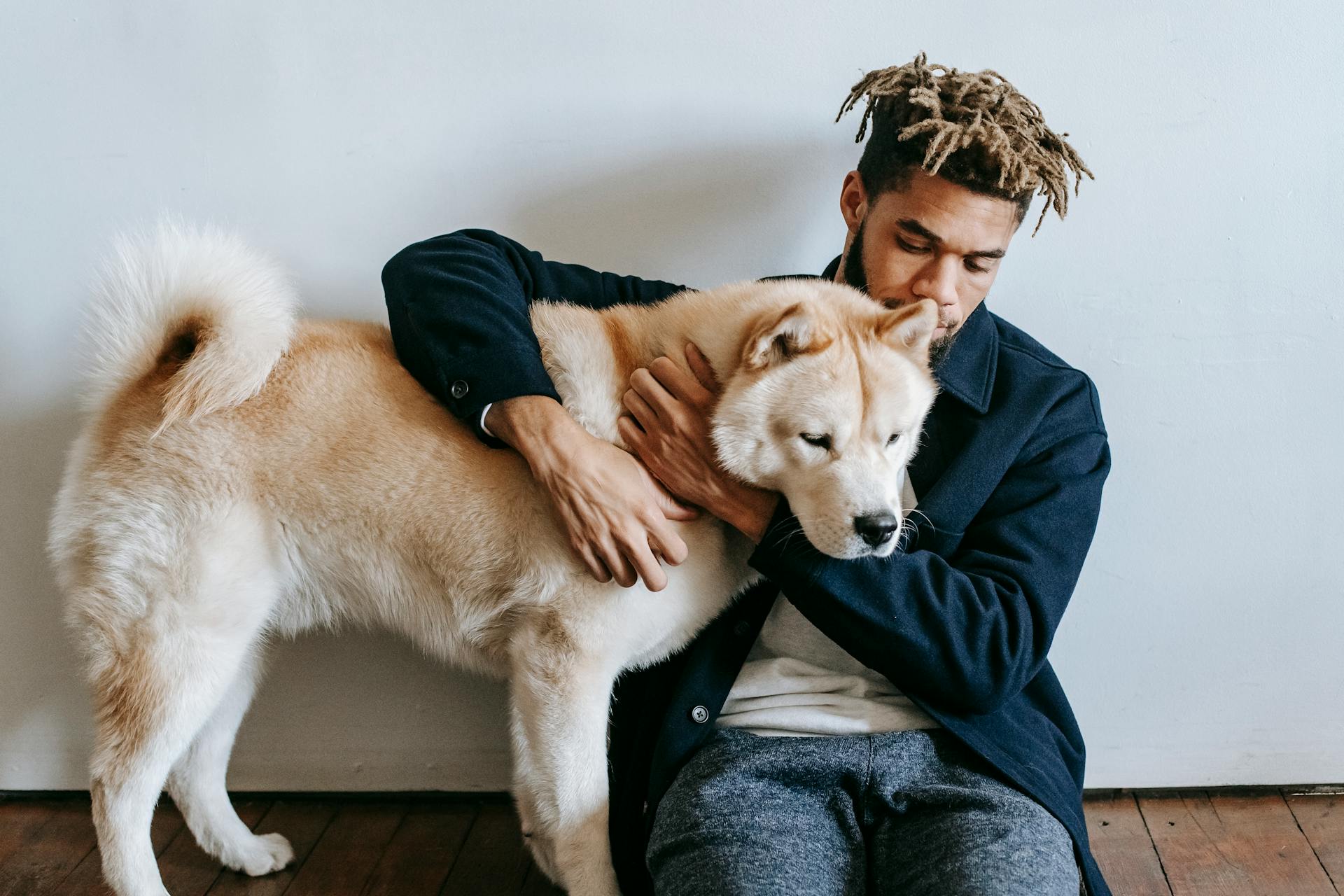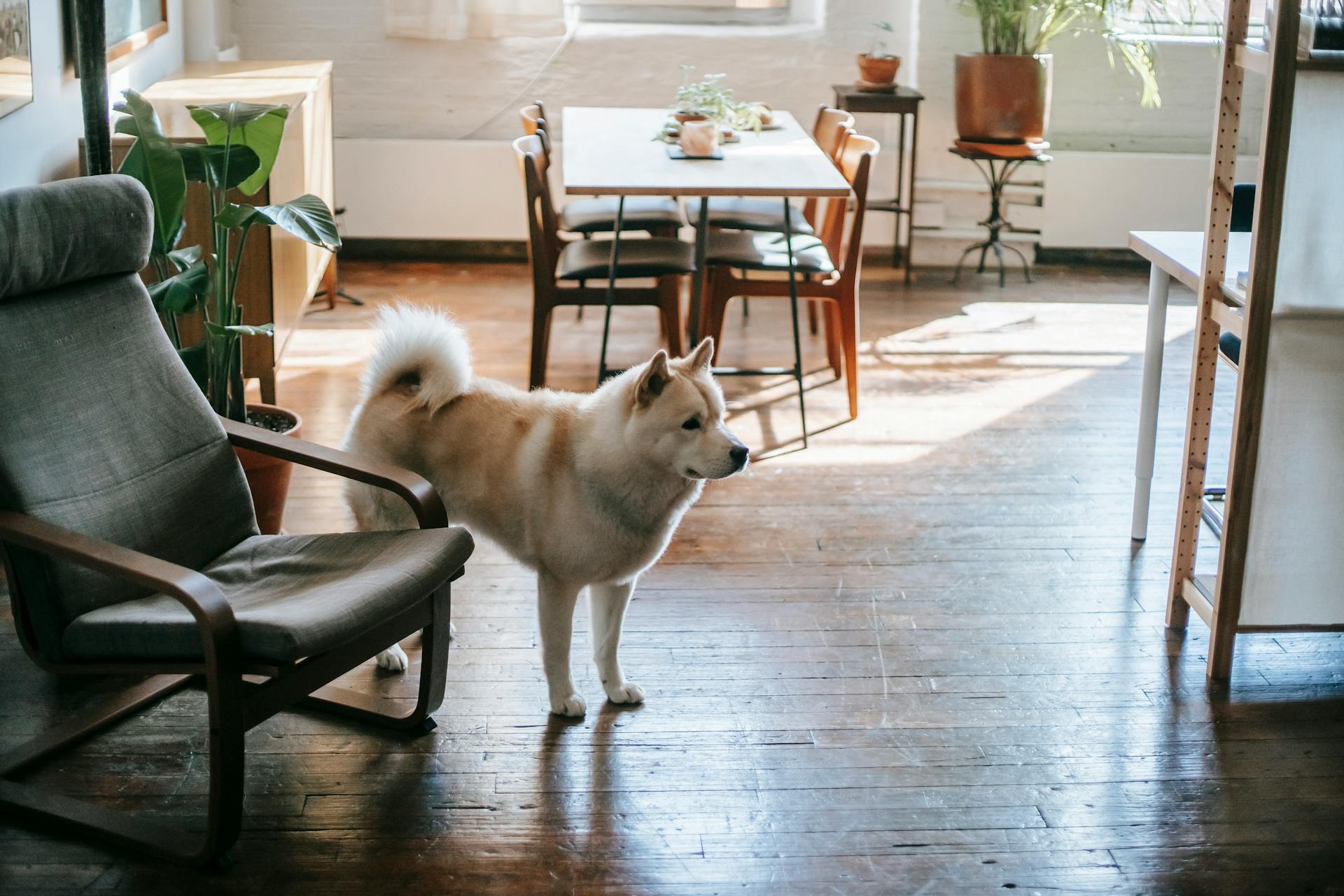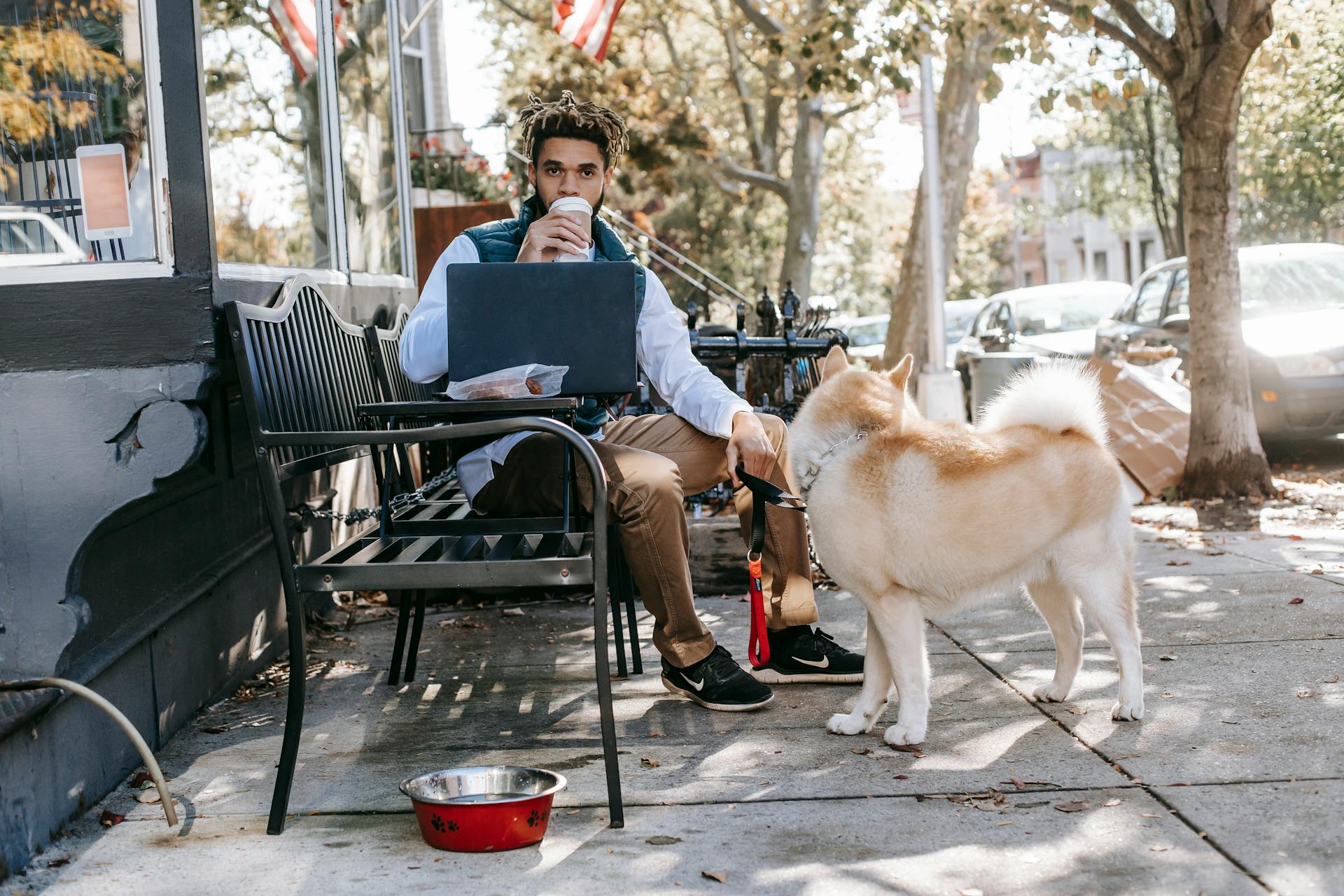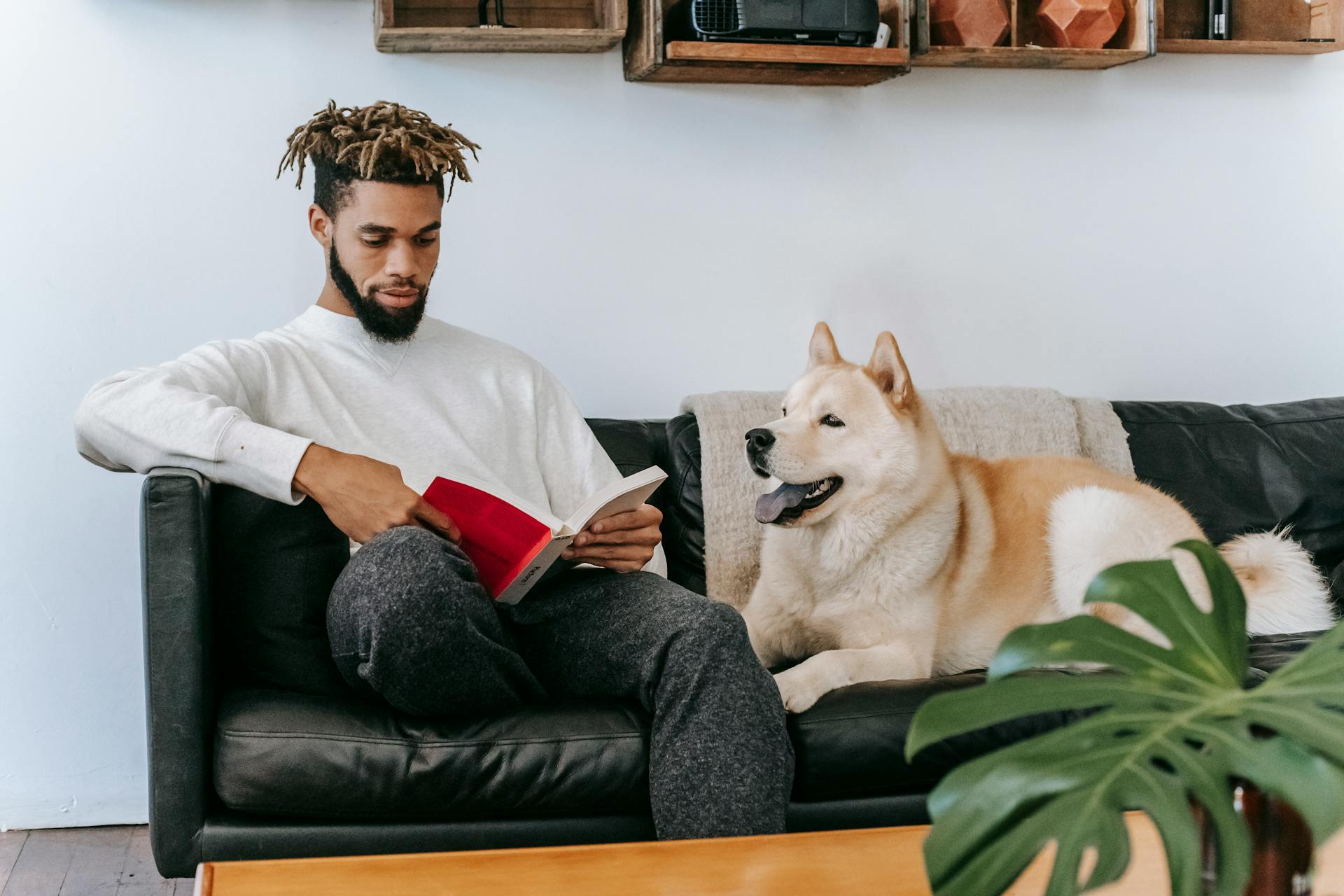
The Akita Inu is a breed like no other, with a unique set of behavior and personality traits that set them apart from other dogs.
Their independent nature means they can be aloof with strangers, taking time to warm up to new people and environments.
Akitas are naturally suspicious, making them excellent watchdogs, always on the lookout for potential threats.
They are fiercely loyal to their families, forming strong bonds with those they trust.
With proper socialization, Akitas can become confident and outgoing, but they'll always retain a hint of their introverted nature.
Their intelligence and trainability make them a joy to work with, but they can be stubborn at times, requiring patient and consistent training.
Personality and Temperament
American Akitas are known for their courageous, dignified, and profoundly loyal personalities, making them excellent watchdogs.
They're quite territorial, protective, and fearless, which can sometimes be misinterpreted as a dangerous breed in certain countries. Akitas are suspicious of strangers and will often warn their owners through a distinctive bark that resembles a murmur or moan.
If you're planning to socialize your Akita, it's essential to be present when they meet guests to avoid any potential conflicts. Posting dog "warning signs" on your fences or gates can also help alert visitors to the presence of a protective Akita.
Akitas have excess energy that can manifest into restlessness if not properly expelled, so regular exercise is crucial to prevent destructive behavior. They can be sensitive to how they're treated, so positive reinforcement training is key to developing good behavior.
As a breed, Akitas are often possessive and jealous, so it's best to keep them as your only pet if possible. Without proper training, they may become selfish with their food bowl and toys – and even with you!
Despite their independent nature, Akita puppies are courageous, intelligent, and loving, making them a great addition to any family. They love to cuddle and will be happy to spend time with you wherever you go.
Akitas usually only tolerate other animals, but with proper socialization from a young age, they can become friendlier and more accepting of other pets in the household.
Check this out: The Year of the Puppy How Dogs Become Themselves
Breed History and Characteristics
The Akita is a loyal and steadfast companion, but it's essential to understand its characteristics before bringing one home. This breed is not for everyone, especially those with young children or other dogs.
Akitas are known for being sweet and affectionate with family members, but they can be stubborn and may not tolerate strangers well. They have a tendency to "mouthing", carrying things in their mouths, and may get protective.
In terms of temperament, Akitas have a low friendliness level and are not very kid-friendly or pet-friendly. They have a high exercise need and are playful, which means they require regular physical and mental stimulation.
Here's a summary of the Akita's characteristics in a table:
Breed History
The breed in question originated in the 19th century in Scotland, where it was bred for its distinctive appearance and hunting ability.
It's worth noting that the breed was developed from a mix of local dogs, including the Old English Sheepdog and the Scottish Terrier.
The breed's original purpose was to hunt small game, such as rabbits and rodents, in the dense underbrush of Scotland's countryside.
Its short, dense coat was well-suited to this task, as it allowed the dog to move quickly and quietly through the underbrush without being detected.
The breed's popularity grew rapidly in the late 19th and early 20th centuries, as it became a favorite among hunters and dog enthusiasts alike.
In addition to its hunting ability, the breed is also known for its intelligence and affectionate nature, making it a popular choice as a family pet.
Despite its popularity, the breed remains relatively rare today, with only a few thousand individuals registered with kennel clubs around the world.
Characteristics of the
The Akita breed is known for its unique characteristics, which make it a loyal and loving companion for the right owner. They are a powerful and dignified breed that requires regular exercise to prevent boredom and destructive behavior.
Akitas have a natural tendency towards dominance and can be aggressive if not properly socialized and trained from an early age. This makes them better suited for experienced dog owners who can provide the necessary training and attention.
Their intelligence and athleticism make them naturals at navigating obstacles and following commands. They excel in activities like hiking, agility, and obedience training.
Akitas are known for their loyalty and will form strong bonds with their owners. They are also good watchdogs who will bark to alert you if something is amiss.
Here are some key characteristics of the Akita breed:
Overall, the Akita breed is a unique and loving companion that requires regular exercise, attention, and training.
Training and Socialization
Training an Akita requires patience and consistency, as they can be independent thinkers. They respond well to training, but a lack of structure can make life worse for both dog and human.
Akitas are intelligent dogs that can become unhappy and destructive without proper training. They have guarding instincts and are big, strong dogs, so socialization should start early in their lives.
A different take: Dog Training Stop Biting
To keep your Akita engaged, use positive reinforcement techniques and plenty of treats during short, fun training sessions. This can be as short as 5 minutes a day.
Akitas have a strong prey drive and may not get along with other dogs, so it's essential to socialize them early and often. They can also be hesitant around strangers, so introducing them to new people and animals is crucial.
Here are some tips for socializing your Akita:
- Start socialization early, ideally from birth
- Introduce your Akita to new people, animals, and environments gradually
- Use positive reinforcement techniques, such as treats and praise
- Keep training sessions short and fun
Remember, akitas are more than just dogs - they have psychological and emotional needs too. They need to be treated as a fully-fledged household member, not just a pet.
A proper breeder will start socialization as soon as the puppy is born, and ideally, this socialization will result in puppies that are curious, relaxed, and playful around humans.
By following these tips and being patient, you can help your Akita become a well-behaved and loving companion.
Exercise
Exercise is essential for Akitas, and they require moderate exercise to stay happy and healthy. A brisk walk or two per day, totaling from a half to a whole hour, should suffice.
Their thick coat helps regulate their temperature in both cold and hot conditions, so it's best to exercise them early and late on summer days, and retreat to the AC when it's too hot. Don't shave their coat when it gets warmer – it protects them from infections, irritations, and sunburns.
Akitas love the outdoors, especially during fall and winter, and they thrive in cool weather. However, they don't do well in apartments; they need space and outdoor access to roam freely.
Their powerful prey drive means they'll chase tiny animals with little regard for their own safety or the safety of others. Keep them on a leash or in a fenced yard to prevent any accidents.
Daily exercise is crucial to prevent Akitas from becoming overweight or bored. They do well with long walks in cool weather, hikes, and playtime in the yard, as long as there's plenty of space to run around.
Akitas are naturally inclined to carry things in their mouth, so engaging them in games that stimulate their minds, like carrying a toy or learning tasks, is a great way to exercise their bodies and minds.
Curious to learn more? Check out: Dog Bites Fingers When Taking Treats
Grooming and Care
Akitas are copious shedders, especially twice a year when they blow their coat to mark the seasonal shift. They shed—a lot, like more than a lot, constantly, year-round.
Daily brushing is advised to keep matting at bay and their fastidious nature means they will often clean themselves like cats. Akitas are fastidious groomers, washing their face and muzzle, and avoiding puddles and mud.
You'll need to be a vigilant groomer to keep up with their shedding, but their coat's protective oils minimize the need for tub time. Three or four scrubbings a year should suffice.
Akitas require plenty of exercise and serious training, so be prepared for regular physical activity with your dog. They are powerful, strong, and athletic.
Daily brushing will keep the coat healthy and decrease shedding, so make sure to brush your Akita frequently, especially during peak shedding seasons. You can use a metal comb, pin brush, and shedding rake.
On a similar theme: Do Maltese Dogs Bark a Lot
Unless your dog gets dirty, you don't need to bathe them often, a bath once every three months or so may work well. This will prevent drying out the skin and coat.
Trimming your dog's nails often, brushing their teeth daily, and checking and cleaning their ears as needed are all important aspects of Akita care. If you notice symptoms like irritation or inflammation in the ears, mouth, or on the feet, consult a veterinarian.
Akitas are generally very clean dogs who enjoy taking care of themselves, but they still require regular check-ups with your vet to stay healthy.
Intriguing read: Shiba Inu Ears
Health and Behavior
Akitas can be overwhelming without even realizing it, creating enemies for life in a heartbeat. They're an alpha dog, possessive of food and toys.
An Akita isn't clingy but can easily become defiant. Containing a fight is difficult with Akita, so do whatever you can to anticipate fights and squelch them right away.
I've noticed that a female Akita will have slightly lower aggression levels than a male one, making them a great option for first-time Akita owners. With two Akitas in the same household, you'll see plenty of power struggles, though in male-female combos the male will always take the lead and dominate the relationship.
Take a look at this: Shiba Inu Female
Tolerance
Tolerance is a key aspect of an Akita's behavior, and it's essential to understand their limitations. Akitas are dominant and territorial, so they don't tolerate pets that resemble prey, such as hamsters.
This can be particularly challenging if you have other pets in the household. Akitas loathe other dogs of the same sex, including other Akitas, so socialization and training are crucial to overcome this attitude.
However, even with proper training, there's always a remnant of this territorial behavior in an Akita. The best remedy is to keep an Akita in polite company and avoid situations that might escalate.

Strangers should also be cautious when approaching an Akita, as they don't take kindly to being teased or fondled without invitation. Akitas get used to their humans, but strangers should be aware of this.
In fact, the Japanese royalty even hired dedicated Akita keepers to manage their interactions with these dogs. Today, specialist handlers deal with Akitas in dog shows, and even they must be mindful of the dog's comfort level around judges.
Behaviour
Akitas can be cautious and reserved, but also overwhelming without even realizing it, creating enemies for life in a heartbeat.
They're alpha dogs, possessive of food and toys, and don't like being teased or having their belongings fiddled with.
Containing a fight is difficult with an Akita, so it's essential to anticipate fights and squelch them right away.
Expect your Akita to have natural guarding instincts that you should bring to heel.
One-to-one obedience classes with an expert trainer are highly recommended to help manage an Akita's behavior.
Adopting a female Akita might be a good option, as she'll have slightly lower aggression levels than a male one.
With two Akitas in the same household, you'll see plenty of power struggles, and in male-female combos, the male will always take the lead and dominate the relationship.
I've observed firsthand that Akitas can intervene when their companion gets upset with a stranger dog, as I've seen Bakudai intervene when Aimi got upset with a neighbor's dog.
A unique perspective: Why Are Male Dogs More Affectionate
Overview
If you're considering bringing an Akita into your family, think carefully about their exercise needs - they require regular physical activity to stay happy and healthy.
Akita's aren't suitable for all households, so it's essential to consider their temperament and grooming needs before making a decision.
Their exercise needs mean they need a big backyard or regular walks, which can be a challenge for families with small living spaces or busy schedules.
Akita's are a loyal and loving breed, but they can be wary of strangers, so it's crucial to socialize them well from an early age.
Their thick coats require regular grooming, including brushing and occasional bathing, to prevent matting and tangling.
With the right care and attention, Akita's can thrive in a loving home and become a wonderful addition to the family.
Check this out: Akita Dog Grooming
Family Time
Spending quality time with your Akita is essential for their socialization and happiness. They thrive on interaction and attention from their family.
Akitas love to participate in family activities and can enjoy activities like carrying toys and other items. This is especially true if they're included in the fun from an early age.
They can become a neighborhood mascot if socialized properly through group activities and friendly interactions with strangers. This helps them feel at ease in new situations.
Akitas need their personal space, but leaving them alone for too long can be detrimental to their well-being. This is because their protector instincts can kick in, making them wary of strangers.
If your Akita is behaving well, they can be as cuddly and playful as a cat. They'll enjoy snuggling and playing with their family members.
Halloween and Special Events
Akita Inus are naturally wary of strangers and may become protective of their family during special events like Halloween. They can be sensitive to loud noises and sudden movements.
Their strong prey drive means they may chase after trick-or-treaters if not properly socialized, so it's essential to keep them on a leash or in a secure area.
Akita Inus are intelligent and trainable, but they can be stubborn at times, requiring consistent and positive reinforcement training.
Tips and Advice
Akitas are naturally protective of their family, so socialization is key. They need to be exposed to new people, places, and experiences from an early age to prevent aggression.
Akitas are known for their independent nature, so they don't require constant attention. In fact, they can be happy with just a few hours of exercise and playtime per day.
To prevent destructive behavior, provide your Akita with plenty of chew toys and rotate them regularly to keep things interesting. This will save your shoes and furniture from becoming chew toys.
Akitas are intelligent and trainable, but consistency and patience are essential. Positive reinforcement techniques, such as treats and praise, work best for this breed.
Regular grooming is a must for Akitas, as their thick coats can mat and become painful if not properly maintained. Brush your Akita at least twice a week to prevent this.
Akitas are naturally clean dogs and are often described as "cat-like" in their grooming habits. They are fastidious about their personal hygiene and will often clean themselves after meals.
A different take: How Often Do Dogs Attack Their Owners
Sources
- https://www.thefarmersdog.com/digest/akita-breed-guide-personality-history-training-food/
- https://www.thesprucepets.com/breed-profile-akita-1117933
- https://www.neewadogs.com/blogs/blog/the-akita-dog-breed-a-comprehensive-guide-to-their-strengths-and-weaknesses
- https://www.holistapet.com/blogs/dog-breeds/american-akita
- https://theakitainu.com/akita-temperament-expected-behaviour/
Featured Images: pexels.com


